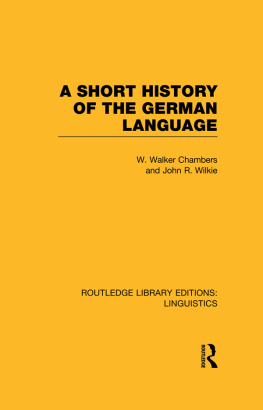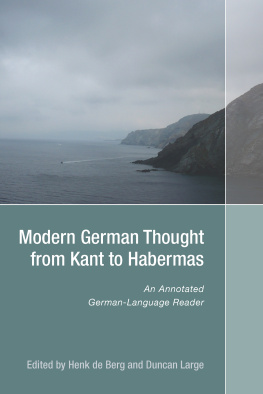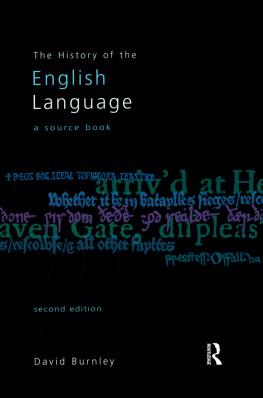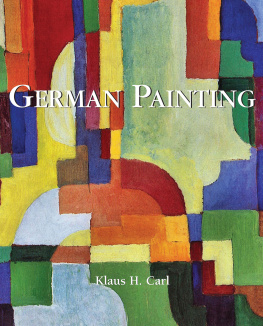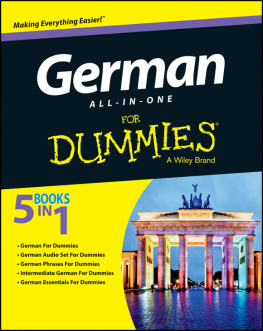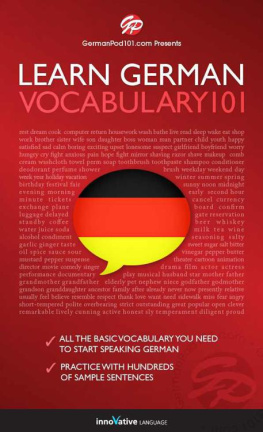ROUTLEDGE LIBRARY EDITIONS: LINGUISTICS

Volume 50
A SHORT HISTORY OF THE GERMAN LANGUAGE

A SHORT HISTORY OF THE GERMAN LANGUAGE
W. WALKER CHAMBERS AND JOHN R. WILKIE

First published in 1970
This edition first published in 2014
by Routledge
2 Park Square, Milton Park, Abingdon, Oxon, OX14 4RN
Simultaneously published in the USA and Canada
by Routledge
711 Third Avenue, New York, NY 10017
Routledge is an imprint of the Taylor & Francis Group, an informa business
1970 W. Walker Chambers and John R. Wilkie
All rights reserved. No part of this book may be reprinted or reproduced or utilised in any form or by any electronic, mechanical, or other means, now known or hereafter invented, including photocopying and recording, or in any information storage or retrieval system, without permission in writing from the publishers.
Trademark notice: Product or corporate names may be trademarks or registered trademarks, and are used only for identification and explanation without intent to infringe.
British Library Cataloguing in Publication Data
A catalogue record for this book is available from the British Library
ISBN: 978-0-415-64438-9 (Set)
eISBN: 978-0-203-07902-7 (Set)
ISBN: 978-0-415-72739-6 (Volume 50)
eISBN: 978-1-315-85238-6 (Volume 50)
Publishers Note
The publisher has gone to great lengths to ensure the quality of this reprint but points out that some imperfections in the original copies may be apparent.
Disclaimer
The publisher has made every effort to trace copyright holders and would welcome correspondence from those they have been unable to trace.
A Short History of the German Language
by
W. WALKER CHAMBERS
and
JOHN R. WILKIE
METHUEN & CO LTD
11 NEW FETTER LANE LONDON EC4
First published 1970 by Methuen & Co Ltd
1970 by W. Walker Chambers and John R. Wilkie
Printed in Great Britain by
Richard Clay (The Chaucer Press), Ltd
Bungay, Suffolk
SBN (hardbound) 416 15980 X
SBN (UP) 416 18220 8
This title is available in both hard and paperback editions. The paperback edition is sold subject to the condition that it shall not, by way of trade or otherwise, be lent, re-sold, hired out, or otherwise circulated without the publishers prior consent in any form of binding or cover other than that in which it is published and without a similar condition including this condition being imposed on the subsequent purchaser.
Distributed in the U.S.A.
by Barnes & Noble Inc
Students embarking on a study of the history of the German language often seem dismayed by the amount and range of unfamiliar detail which they are expected to control. They tend to lose their way in a field of study which should afford them both profit and pleasure. This short account of the subject may help them to obtain a knowledge of the main facts, chronological, geographical, and linguistic, and of how they fit together. We hope that simplification has not resulted in distortion and that the student will not only realize something of the scope of the subject but also acquire a reliable foundation for more advanced work.
Our aim has been to write a fairly orthodox account of the subject without entering much into the many controversies which dominate the field today. We have concentrated chiefly on the development of the standard literary language the kind of German which British students know best and study most fully and have reduced references to dialects and colloquial language to the essential minimum. We have also taken the risk of leaving aside all systematic treatment of phonetics and general linguistics (though may serve as an appetizer). These subjects are of some importance even to beginners; but they are already treated in excellent introductory books, some of which are listed on page 7. Descriptive and structural linguistics lie outside the scope of this book and may in any case be more appropriate for later stages of study.
The material is arranged in three parts. The first deals with the development of German from Indo-European onwards, against a background of the history (and prehistory) of the German-speaking community; the second covers the development of German vocabulary. These, it is hoped, are readable accounts which will give the student an impression of the development in its broad outlines. The third part surveys changes in sounds, forms, and syntax. These topics have been left to the end because they are the most arduous. It seemed more helpful to set out changes in sounds and forms in some detail, with examples, rather than to treat them in broad general terms. Because of this the final chapters can hardly be readable in the ordinary way; but they constitute an important aspect of the subject and will, it is hoped, be more meaningful and therefore more manageable because of the perspectives offered in earlier chapters. Cross-references throughout the book indicate some of the many links between chapters.
The list of books for further reading at the end of each chapter has been restricted to a few specially useful titles; a fuller bibliography is to be found among the appendices. These also contain a table showing the development of strong verb classes and some representative specimens of medieval and modern German (with specimens of other Germanic languages for comparison); these passages may help to make the history of the German language more vivid and less abstract.
We gratefully acknowledge the valuable comments and other help received from colleagues and friends, especially from Dr Gillian Rodger and Dr W. R. W. Gardiner in Glasgow, and from Mr C. D. M. Cossar, Mrs Susan G. V. Ellis, Mr J. E. Tailby, and Mrs Sheila R. Wilkie in Leeds; as well as from Mrs Pamela Freeman and Mr John Roberts, who helped with the maps.
Glasgow and Leeds | W. W. C. |
July 1969 | J. R. W. |
Only grammatical and linguistic terms are included here; other abbreviations should be intelligible from the context.
acc. | accusative |
Alem. | Alemannic |
Bav. | Bavarian |
dat. | dative |
EFranc. | East Franconian |
Eng. | English |
fem. | feminine |
Fr. | French |
Franc. | Franconian |
gen. | genitive |
Ger. | German |
Gk. | Greek |
Gmc. | Germanic |
Goth. | Gothic |
HG. | High German |
IE. | Indo-European |
infin. | infinitive |
L., Lat. | Latin |
masc. | masculine |
MG. | Middle German |
MHG. | Middle High German |
mod. | modern |
neut. | neuter |
NHG. | New High German |
Next page
